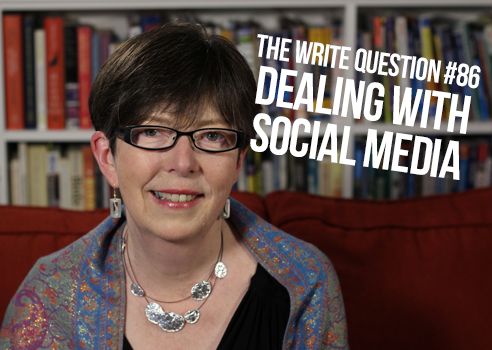Viewing time: 5 mins 16 secs.
The Write Question is a weekly video podcast about writing that I started in 2017 and that ran, more or less weekly, until April 2022. This is a republication of issue #86, which addresses the question: how do writers and social media mix. The post first ran on Feb. 22/19.
Transcript:
Welcome to The Write Question, I’m Daphne Gray-Grant and my topic today is about how writers can deal with social media.
I have a question from Jordan McKenzie, a writer based in Philadelphia, Pennsylvania. Here’s what she’s asked:
“I have some bad habits relating to social and digital media. I’m always looking at my phone and I can lose hours of my day to Facebook. Both of these tasks end up eating into my writing time. Do I need to go on a digital diet? Please tell me what I can do.”
Thanks for your question, Jordan. Not many writers are willing to admit to this social media habit and, in fact, many don’t see it as a problem. But I do. And not just professionally but also, socially. In my household we have a rule: No cellphones at the dining-room table. Although it’s very tempting to get the “right” answer from Dr. Google at every moment of the day and night, I think it’s also important to have face-to-face social time with family and friends.
But let’s get back to the professional problem. While cellphones are very convenient, especially for writers — you can text, check email, look up facts and even record interviews— they are also a big barrier for the act of writing. Why?
They don’t allow us to think. Have you ever noticed how compulsively you check your device for emails or texts or Facebook posts? Our brains get a little squirt of dopamine — a chemical that makes us feel great — every time we see something interesting.
Furthermore, we see something interesting only intermittently, or in an unpredictable fashion. Now, you might think that an intermittent reward would make us to find it EASIER to break our addition to social media. But, in fact, the exact opposite is true. Psychology researchers have long considered intermittent reinforcement the most powerful motivator on the planet.
In the 1950s, famous American psychologist B.F. Skinner found that what he called a variable reward schedule was much more effective and enticing than rewarding people every time they performed a particular action.
In any case, a variable reward is certainly what you get with social media. Much of the time you’re forced to look at unspeakably boring dreck and then, every once in a rare while, you get Henri le chat noir. Link below.
Anyway, Jordan, what you have is a social media habit. And you’re quite right – it’s eating into your writing time. I suggest you start working changing that habit.
Habits are linked with a primitive part of our brain, the basal ganglia, the same part that controls automatic processes such as breathing and swallowing.
So here’s what happens with a habit: A cue sparks you to do something – for example, getting ready for bed probably causes you to brush your teeth. Our brains like to find ways to reduce the need to think so, just like you learned to brush your teeth — or read, or ride a bike, or drive a car — you now do all those things without much thinking.
Consider what kinds of cues are causing you to check your social media accounts without thinking. I’m guessing the cue might be boredom. Anyway, spend at least a couple of days investigating your habit. Make a note — maybe in your cellphone! — every time you’re drawn to check social media and figure out how you feel when you’re doing it.
Now, you could always try to shut down your social media accounts, but I think it will be more effective — and more rewarding — if you replace the one habit with another, better one.
You’re probably still going to have your phone with you most of the time, right? So why not spend three minutes listening to a song? There all right there on your phone. And that will be a fun and brief activity, right? It’ll dispel any boredom. And it won’t impinge on your creativity. In fact, the music might even make you more creative.
I hope this trick works for you, Jordan.
Finally, let me wrap up with a quote from Cal Newport, an associate professor of computer science at Georgetown University: “If every moment of potential boredom in your life—say, having to wait five minutes in line or sit alone in a restaurant until a friend arrives—is relieved with a quick glance at your smartphone, then your brain has likely been rewired to a point where… it’s not ready for deep work—even if you regularly schedule time to practice this concentration.”
Thanks for the question, Jordan! I’m including a link to Cal Newport’s website, below. Newport is a powerful advocate against social media and if you’d like to learn more about his views, I suggest you check out his book, Digital Minimalism, link below, or his blog, which is called Study Hacks. If you follow his advice, I think it will make you a more successful writer.
Links:
Digital Minimalism by Cal Newport


